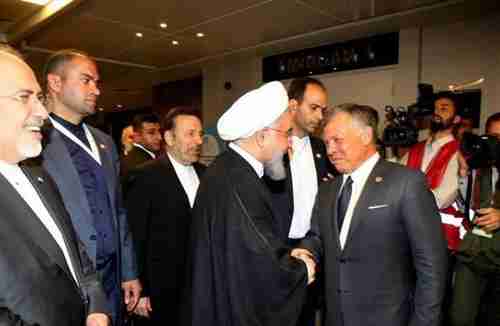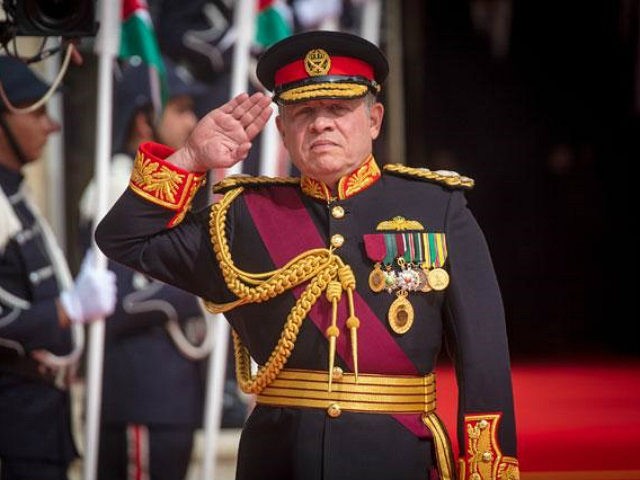This morning’s key headlines from GenerationalDynamics.com
- Jordan’s government in chaos as PM resigns in face of anti-government protests
- Fears grow that Jordan will be the next victim of the ‘Arab Spring’
Jordan’s government in chaos as PM resigns in face of anti-government protests

Protests in Amman, Jordan, on Sunday (Sky News)
Anger over a proposed tax law has triggered five days of mass protests in the streets of Amman, the capital city of Jordan, by thousands of protesters, forcing Jordan’s prime minister Hani Mulki to hand in his resignation.
The protests were non-violent, but they are exceptional because any protests at all have been rare in Jordan for decades. Nonetheless, 60 people were arrested for breaking the law, and 42 security force members were injured.
Jordan’s battered economy comes from an unemployment rate of 18.4 percent, with a burgeoning population in one of the most arid countries in the world.
The wars in Syria, Iraq, Yemen, and Sudan that began with the “Arab Spring” in 2011 have been particularly harsh on Jordan’s economy. According to the United Nations human rights agency (UNHCR), Jordan is hosting 750,000 refugees from these wars. There are 650,000 Syrians, and the others are from Yemen, Iraq, and Sudan.
The proposed law would raise taxes on ordinary people by at least 5 percent and on businesses by 20-40 percent. The tax increases are part of an austerity program required by the International Monetary Fund (IMF) in return for an IMF loan of $723 million to Jordan in 2016. The tax increases come after five successive fuel price rises, electricity hikes, and the scrapping of bread subsidies.
Jordan’s King Abdullah replaced the departing prime minister Hani Mulki with Omar al-Razzaz, a former World Bank economist, in the hope that al-Razzaz can form a government that will be able to find a magical way to solve all the economics. Petra (Jordan) and Reuters and Al-Jazeera
Fears grow that Jordan will be the next victim of the ‘Arab Spring’

Jordan’s King Abdullah shakes hands with Iran’s president Hassan Rouhani at last month’s OIC meeting in Istanbul (hala.jo)
The current protests were triggered by the proposed tax law that will substantially raise taxes on an already impoverished public.
But a scathing editorial in the Jordan Times describes how the situation in Jordan is far worse than simply the fact that people are extremely poor:
From the view of the people taking part in the protests: government officials keep get high salaries regardless of the duration of their services, ministers get salaries for life even if they serve for one day, officials get luxury cars with drivers from taxpayers’ money, they do not pay for gasoline and thus are unaware of the burdens people are shouldering, they get to travel a lot to unneeded conferences and they get per diems for doing so, they send their children to expensive private schools, rather than poorly equipped government schools, they receive treatment at private hospitals or abroad as public hospitals are left for the needy, etc. People also complain that the government is not serious in tackling corruption, big and small, and is not doing much to improve basic services and cutting expenses and little is being done to ensure that services are being offered to citizens in a fair manner.
From time immemorial, this kind of situation where peasants and workers need protection from excesses of their élite leaders has led to popular protests, some more serious than others, some leading coups and revolutions.
The “Arab Spring” of 2011, which was triggered by the death of a Tunisian food vendor, resulted in violent protests in Tunisia, Egypt, Yemen, Libya, Syria, and other Arab countries. So far, Jordan has been relatively immune, but there are concerns that it is about to be Jordan’s turn. The current crisis could spin out of control and play into the hands of the Muslim Brotherhood or the so-called Islamic State (IS or ISIS or ISIL or Daesh).
Jordan’s crisis goes beyond its borders, especially since Saudi Arabia, Egypt, Bahrain, and United Arab Emirates (UAE) began their blockade of Qatar in 2016. This sharp split among the Arab nations has had the effect of relegating Jordan to secondary status in the region. Saudi Arabia has stopped providing financial aid to Jordan and refused to extend a five-year aid package worth $3.6 billion at the beginning of 2017.
The United States also provides $1.3 billion financial aid to Jordan each year, but the Trump administration may halt or reduce that amount as a result of a general review of foreign aid. The review comes atop of a sharp cut in U.S. aid to UNRWA, the UN agency exclusively providing services to the roughly 2 million Palestinian Arab refugees and their descendants in the Hashemite kingdom, and which has increased the burden on the already very weak Jordanian economy.
Jordan’s King Abdullah used to consider Iran to be the mortal foe of the Arab world, so the Arab world was shocked recently when King Abdullah had a very friendly handshake with Iran’s president Hassan Rouhani during the Organization of Islamic Cooperation (OIC) summit in Istanbul.
Following last year’s Saudi blockade of Qatar, there was a realignment of Mideast countries, with Egypt, Saudi Arabia, UAE and Israel on one side, and Qatar, Iran, and Turkey on the other side. Abdullah’s handshake with Rouhani suggests that Jordan is switching sides to the second alignment, as Abdullah desperately looks for financial aid. Jordan Times and Middle East Eye and Israel National News and Middle East Eye
Related Articles:
- Mideast war widens as Jordan vows to destroy ISIS (06-Feb-2015)
- Jordan’s King Abdullah tells Congress that Palestinian issue is the core issue (08-Mar-2007)
- The bizarre November 9 bombings in Amman, Jordan (15-Nov-2005)
- Egypt calls Qatar an ‘enemy state’ (30-Jun-2016)
- Saudi Arabia and other Arab nations cut ties with Qatar in new Mideast crisis (06-Jun-2017)
KEYS: Generational Dynamics, Jordan, King Abdullah, Hani Mulki, Omar al-Razzaz, International Monetary Fund, IMF, Arab Spring, Muslim Brotherhood, Iran, Hassan Rouhani, turkey, Qatar, Saudi Arabia, Egypt, Bahrain, United Arab Emirates, UAE, Israel, Islamic State / of Iraq and Syria/Sham/the Levant, IS, ISIS, ISIL, Daesh
Permanent web link to this article
Receive daily World View columns by e-mail

COMMENTS
Please let us know if you're having issues with commenting.